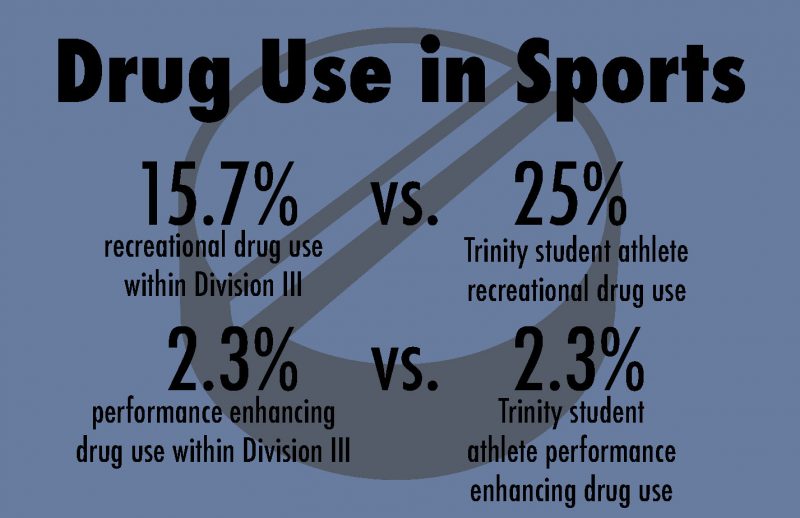A memo from Deneese Jones, vice president for Academic Affairs, announced on Wednesday that a new policy regarding athlete drug testing will be instituted this fall. Athletes will now be subject to random tests for performance-enhancing drugs (PEDs) as part of a “PED initiative” that Jones, Bob King, director of athletics, and Trinity coaches are in the process of developing.
According to National Collegiate Athletic Association (NCAA) guidelines, after one positive test, athletes will lose one full year of eligibility. A second offense will result in the loss of all remaining eligibility.
Currently, NCAA Division III policy does not require any drug tests at the DIII level unless a team is participating in national playoffs. Trinity’s new random tests will test for PEDs, such as amphetamines and anabolic steroids. The tests will also apply to some over-the-counter drugs. Trinity will continue to not test for recreational drugs.
“Because Division III programs are generally smaller and the student athletes do not receive scholarships, regular season testing has not been mandatory in the NCAA. However, in post-season, we are subject to testing,” King said.
In an anonymous survey conducted by the Trinitonian, 21.8 percent of athletes admitted to using recreational drugs while in season, and 2.3 percent admitted to using PEDs. These numbers are similar to those reported by the NCAA for DIII at a national level. While DIII schools are not required to test for drug use, DI and DII athletes are regularly subjected to tested. This is reflected in the numbers. In a 2014 study, 29 percent of DIII athletes surveyed admitted to using marijuana, while the number was only 16 percent in DI. Amphetamines — a type of PED — were reportedly used by 5.7 percent of DIII athletes surveyed, and 3.9 percent of DI athletes.
Jones states in the memo that Trinity’s initiative against PEDs is coming at a time when many DIII schools across the country are taking similar steps against PEDs. Nearly 30 percent of DIII programs have adopted similar programs.
“Across the country, there is a growing conversation about PED abuse at the collegiate level. By meeting and exceeding the NCAA’s existing requirements, we can ensure that Trinity student-athletes, parents, alumni and fans that our athletic teams are positioned to succeed both on and off the field of play,” Jones wrote.
Jones also emphasized that the initiative is not focused simply on apprehending athletes that use PEDs, but also on preventing PED use and educating athletes on the effects of PEDs.
“The testing and education will also provide student athletes with insight into the supplements and other over-the-counter products that may seem harmless but could result in a violation,” Jones wrote.
Mia Loseff, junior track athlete, was surprised by the change in policy.
“I don’t understand why the university feels the need to employ this because as far as I know, we do not have an issue with performance-enhancing drugs. It seems like a wrong placement of resources, and I think they are wasting their time employing these tests because I don’t think they will find anyone who tests positive,” Loseff said. “I think it’s naive to say that athletes don’t use drugs at Trinity, but I also don’t think it’s a huge issue for us because we don’t let it interfere with our seasons and our ability to perform well.”
Tilden Oliver, junior tennis player, agreed with Loseff.
“I don’t think it is necessary [to change the policy], but I understand why the athletic department made the decision. It will be interesting to see if this new policy will change anything in our sport team’s performances,” Oliver said.
Loseff claims that while athletes do use drugs recreationally (such as marijuana and cocaine), she has never thought of PEDs as an issue.
“I don’t think [drug policies] should change. We are DIII and by choosing DIII, we are choosing to not have to commit our lives to our sports, so I feel as though having NCAA drug test us would be a waste of resources and highly unnecessary,” Loseff said. “As far as I know most athletes don’t use the enhancers, and I think that since recreational drugs have little impact on gaining an unfair advantage on the competition, we should be allowed to use them without trouble.”
The PED initiative is still under development, and Jones welcomed feedback in her memo.
“[We are working] to develop policies and structures that best meet the needs of our athletes and teams. In the meantime, I wanted to begin this important conversation. I welcome your questions and feedback to guide our internal planning,” Jones wrote.







